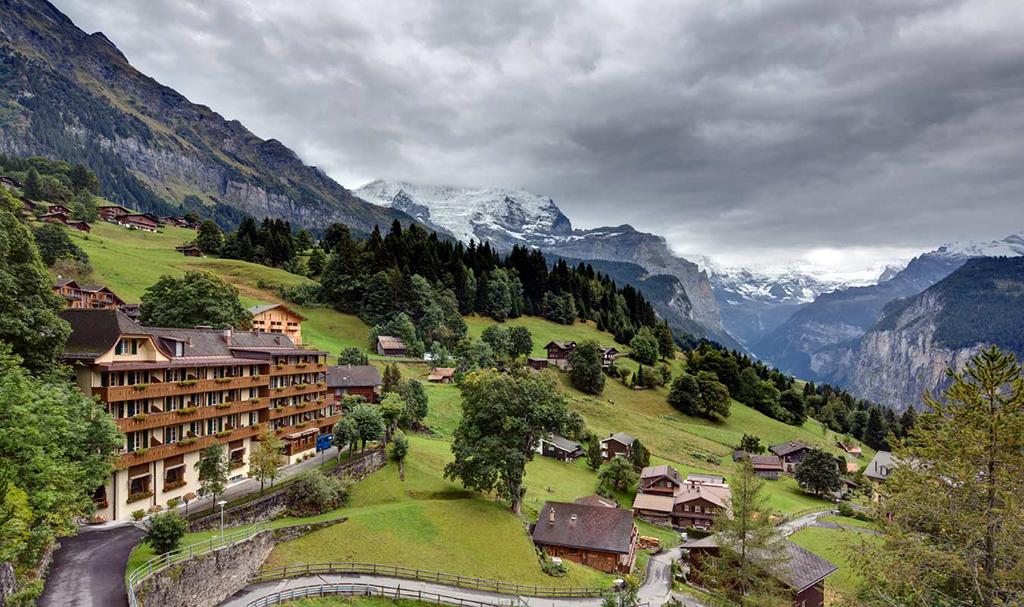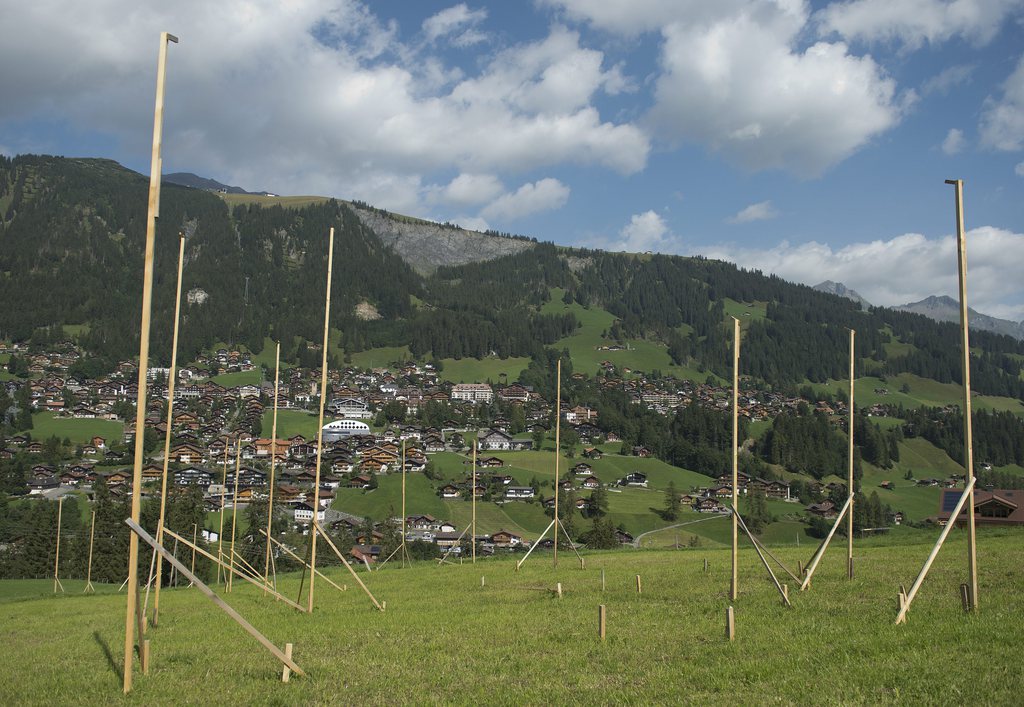Resort of Wengen anxiously awaiting second-home law

Alarmed at the number of empty holiday homes blighting the countryside, the Swiss voted to curb construction in 2012. But in the alpine resort of Wengen, lack of clarity on how the law will be implemented is frustrating buyers and sellers.
Wengen, one of seven villages that belong to the commune of Lauterbrunnen in the Bernese Oberland, is a popular ski resort that witnessed a construction boom of second homes in recent years, just the kind of place the new law was targeting.
“Nothing is clear,” Markus Zumbühl, vice-president of Wengen TourismExternal link and owner of the Alpia sports shop, told swissinfo.ch. Like many in this small community, he wears more than one hat. “At the moment we are waiting for the rules from the commune.” As a result, he said, certain projects are stalled.
The four-star Hotel SilberhornExternal link is a case in point. Its application for converting part of the yellow stucco hotel into apartments was lodged before the March 2012 vote. But work cannot yet proceed, according to property agent Clare Regez of Alpine Immobilien.
“The local government still has to decide if owners have to rent out or not,” she explained, alluding to the ‘cold beds’ problem that inspired the new law. “And if they do, should it be through an established rental company or the hotel?”
The 50% rule
And that’s not the only issue for the Silberhorn, a stone’s throw from the village train station on Wengen’s main street. Another dilemma awaiting a verdict: how to apply the 50% rule that divides buyers into two groups: foreigners and Swiss (including long term Swiss residents)? Do the officials count the hotel plus the conversion wing as one entity, or split it in two? It makes a big difference. If it’s the former, then foreigners can buy all the apartments since the hotel owner is Swiss. But if it’s the latter, only half can be sold to foreigners.
Though Regez still tries to sell the Silberhorn properties to both foreigners and Swiss, she has been forced to tell prospective owners the conversion is at a standstill until the local government provides answers.
Peter Staub, the commune’s building manager, declined to comment on the specific issues raised, but pointed out that Lauterbrunnen was bound to implement all aspects of the federal law and would only be free to add tighter regulations.
Wengen’s president for tourism, Judith Graf Engi, urged patience. “It is wrong to blame the community of Lauterbrunnen for acting too slowly,” she said. “They cannot do anything before the Swiss parliament has decided and laid down the rules. It could still take time until the law is ready.”
‘Perfect property’
At least one disappointed buyer, a couple from Singapore, is now considering pulling out of the Silberhorn deal. They had signed an initial contract last year for what they thought was a perfect property on the second floor. With four small children, they loved the hotel’s close proximity to the train and the gondola, and the Coop supermarket right next door. “I am wondering now if it’s worth getting this apartment with so many restrictions,” the owner complained as she pondered other possible options. “It could affect the future price.”
The Singaporean couple is Alpine Immobilien’s second Asian buyer in Wengen. The main buying interest still comes from a core of English investors as well as Germans, Dutch and other Europeans.
Reputed to have the most magnificent scenery in Switzerland, the relatively traffic-free village is perched on a sunny shelf under the Eiger, Mönch and Jungfrau mountains. Its miles of ski runs and connections to neighbouring resorts Mürren and Grindelwald draw crowds in peak winter periods, while in summer guests enjoy innumerable hiking paths, often full of cows, sheep and free flowing fountains.
“Wengen is different from many of the other ski resorts where we sell property,” said Simon Malster of Investors in Property in Britain, who works in association with Alpine Immobilien.
“It has an established clientele who return year after year and those clients would only buy in Wengen.” Little wonder, he says, that for a solid decade Wengen enjoyed a sustained building boom, which was set to naturally taper off. “There is not much land available for new building so new building had slowed down anyway,” he explained, adding that in his view the new restrictions would actually have limited impact on Wengen.
Building gloom
Still, villagers in the building trade continue to fret about losing a hefty chunk of their livelihoods, which they blame on the new law. While several projects are underway, having been approved before the vote, they worry about what happens after those are finished. “For all people in construction in the mountains, it’s a disaster,” said local architect Mirko Leonini, referring to the new law. “We in the country have no chance against people in the city who voted for this. It’s a democracy that is like communism.”
“It’s not easy to say whether it [the new law] is good or bad,” says Graf Engi. “The building companies will say that it is bad because they think they cannot build as much as before. In my opinion it couldn’t go on as it did.”
Guessing when the law may be overturned became a local pastime after the vote was announced. Martin Stäger, who is running for president of Lauterbrunnen commune on September 28, thinks it could change in “five or ten years.” Zumbühl agrees that a change seems likely. “It’s mission impossible the way it is now,” he says. “But I think we will find a solution so the economy won’t be completely stuck. Perhaps we will have to make it easier for people to rent out cold beds with a better type of management.”
Rising prices
In the meantime, Clare Regez says loyal Wengen guests have been “panic buying” this year, fearing a closing window on bolt holes in their favorite holiday destination. While 2013 was slow, Regez has already sold 16 properties in 2014, many of them new homes; 21 others are still on the market—including 13 new ones.
Several of the new units are in Wengen’s Panorama Park. A steep downhill trek from the train and the gondola, this massive development was approved long before the second home ban took effect. Located in lower Wengen, builders have just finished the third of six large chalets, each one taking a year to complete. Apartments in three of six are on the market as holiday homes; 50% of each are available to foreigners.
Regez maintains that sale prices are rising by around 5% each year, predicting they will continue to climb, thanks in part to the new law. She tells prospective buyers the new regulations—once they are clarified—may well be advantageous. “Prices have been increasing in Wengen for 15 years and will continue to do so,” she predicts.
Currently, most Wengen properties sell for between CHF 8,000 and 12,000 per square metre. That’s high enough to keep Wengen on the bubble watch list, according to Claudio Saputelli, head of UBS Real Estate Research. “The uncertainty in the market won’t go away soon,” he said.
Moves in parliament
Parliamentarians voting on the implementation of the second homes initiative have taken a relaxed approach to setting the conditions for properties to be exempt from the construction clampdown.
The Senate voted on Thursday to remove some of the law’s restrictions, for instance, allowing local residents building their principal residence to add a holiday apartment in the same property.
Parliamentarians also opted to make it possible for cantons to authorize the building of new tourist accommodation, as long as the property is advertised on a commercial platform, even for a short time. The cabinet wanted this only to be possible outside tourist resorts.
Environment minister Doris Leuthard said it was necessary to impose conditions on the construction of apartments for tourism and the removal of these restrictions “left a lot open”.
Concessions were also granted to hotels building holiday apartments to supplement their income.
The matter will be debated at a future session by the House of Representatives.

In compliance with the JTI standards
More: SWI swissinfo.ch certified by the Journalism Trust Initiative


You can find an overview of ongoing debates with our journalists here. Please join us!
If you want to start a conversation about a topic raised in this article or want to report factual errors, email us at english@swissinfo.ch.